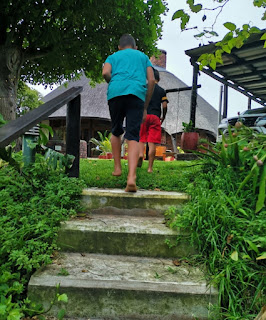Brushing teeth can sometimes be a
challenge for a parent and a little child too. Teaching little children how to
brush their teeth is an important part of helping them develop good oral
hygiene habits that will last a lifetime. It’s also a life skill. By starting early,
we can often turn this into a positive habit instead of a tug of war with
threats from the grown-ups to an upset youngster.
We can begin by wiping our baby's gums with a clean, wet cloth after feedings.
As soon as their first tooth erupts, start brushing twice a day with a
soft-bristled toothbrush and a pea-sized amount of toothpaste. It is always fun
for small children to choose their own toothbrush and toothpaste.
An electric or battery-operated toothbrush is a wonderful beginner’s
toothbrush. It is easier to use, because it basically does the brushing for
you, especially for little ones who haven’t learned the proper brushing
technique, yet. This can be especially helpful for young children who may not
have the dexterity or patience to brush their teeth effectively with a manual
toothbrush.
Electric toothbrushes are easier, so this is important for little children,
who are more prone to cavities than adults. It is usually also way more fun. It
often has entertaining features, such as timers, lights, and music, that can
motivate young children to brush their teeth for the full two minutes
recommended by dentists. I have found through the years that electric
toothbrush are great for teething, helping, and massaging those itchy gums. If
your small child likes to put toys in their mouths or even with biting, electric
toothbrushes might do the trick.
Something else to consider when getting an electric
or battery-operated toothbrush, is to choose a toothbrush with a small, soft
brush head that is appropriate for your child's age and mouth size. Choosing one
that has a built-in timer will be helpful and might just encourage them to brush
the full two minutes. Brushing your teeth together will help to model the
correct way. Singing songs or tell stories while brushing together can also add
some fun.
Be a good role model. Explain why oral hygiene is
important at their age level. And when our little ones see us brushing, flossing
our teeth, and choosing healthy food regularly, they will follow suit. And let your
child practice, brushing their own teeth. As your child get older, you can demonstrate
the proper brushing techniques, brushing the surfaces including the front, back,
top and tongue.
You can also have a chat with your dentist when
choosing the correct toothbrush. They can provide you with additional tips and
advice on how to help your child develop good oral hygiene habits.
Remember to be patient and encouraging through all
of this. Your little one might not always be cooperative. And that is fine and
normal, especial when they are very young. And it may take some time for them
to learn how to brush their teeth properly. Praise their efforts, and as they
develop this life skill, keep on encouraging them.





No comments:
Post a Comment